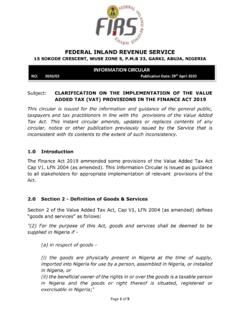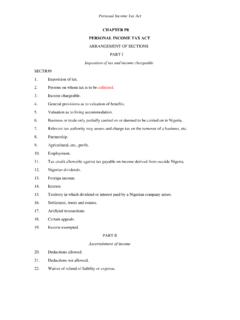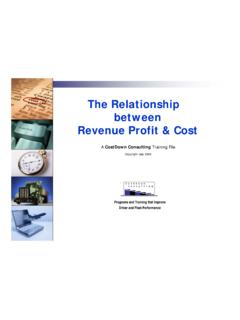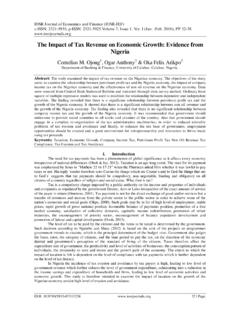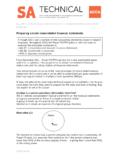Transcription of FEDERAL INLAND REVENUE SERVICE - firs.gov.ng
1 FEDERAL INLAND REVENUE SERVICE . Information No. 2006/02. Circular Date of Publication Feb., 2006. SUBJECT: FURTHER EXPLANATORY COMMENTS ON. WITHHOLDING TAX PRINCIPLE AND OPERATION. This Information circular is issued as a guide to all officers of the FIRS, Consultants and taxpayers to draw attention to the duties and responsibilities imposed on them by the tax statutes. It also aims at correcting and clarifying any ambiguity and misinterpretation that may have been created in previous circulars released by the FIRS on the subject of withholding taxes. Introduction Withholding Tax is an advance payment of income tax. In principle, WHT is a payment on account of the ultimate income tax liability of the taxpayer or company. Withholding tax is not a separate tax on its own and does not confer an exemption from the filing of annual tax returns by the company which had suffered WHT. The tax is normally to be deducted at source when a payment is to be made to the beneficiary.
2 Tax Coverage The withholding tax (WHT) provision was introduced into the tax system in 1977 with limited coverage to rent, dividends and directors fees. Tax deduction at source has since been expanded to include: - all aspect of building, construction and related services . - All types of contract and agency arrangement, other than outright sale and purchase of goods and property in the ordinary course of business. - Consultancy, Technical and Professional services - Management services - Commissions - Interest and Royalty The rates of tax applicable to the various sources is provided in paragraph 6 of this Information Circular. The introduction of the WHT regime came about in order to address the problem of tax evasion although, there is the overriding objective of full disclosure, transparency, predictability and fairness. In the light of these objectives and bearing in mind that the tax is intended as an advance payment of tax, its operation should always be optimized to ensure that taxpayers are not overtaxed and Government does not lose REVENUE .
3 Income subject to Withholding Tax The WHT provisions seek to collect taxes that may otherwise have been lost through evasion and/or avoidance. The aim is to ensure that taxpayers' are correctly taxed but it must be understood that transactions that are ordinarily not liable to tax in Nigeria are also not liable to WHT; thus, contracts and supplies of goods and services performed entirely outside Nigeria by non-resident taxpayers will not be liable to WHT. The residence of the taxpayer is generally not relevant for the purpose of determining liability to tax or the application of WHT, but it is important to consider whether the provider/supplier of the goods or services is liable to Nigerian tax. The incomes that are liable to WHT are discussed hereunder. Rents: This includes rental income on both real and personal property. As a general rule, income on a property (rent, hire or lease payments or rights (royalties) situated in Nigeria is liable to tax in Nigeria, the place of payment not withstanding.)
4 Where a person rents or hires property/ services from another, WHT at the rate of 10% will apply. But where a person provides services to another for air/land transport SERVICE , using its own equipment/facilities, the transaction becomes a contract of services rather than rental or hire. Interest: This is income from investments of every kind. WHT is applicable to income from government securities and income from bonds or Treasury bills. Interest on loans paid by a Nigerian company is often not subject to WHT. Dividends: Refer to income from shares. The income is subject to tax whether it is received by a Nigeria company or a non-resident company. The tax imposed is regarded as final tax, but corporate bodies are allowed to recoup WHT deduction where the dividend is to be redistributed as Franked Investment Income (FII). The Petroleum Profit Tax Act (PPTA) however exempts dividends payable by oil producing companies on petroleum operations from WHT imposition.
5 Royalty: Refers to unearned income which accrues to the owner from past endeavors. Permission must be obtained before it can be used. It is payment of any kind as a consideration for the use of or the right to use any patent, trade mark or right/. Consultancy/Professional/Management/Tech nical services These are specialized services rendered by persons with the required knowledge and skills. The mere fact that services are provided by a company which has consultancy as part of its name does not by itself render such SERVICE as consultancy. The real content of the services being provided must be examined and if it amounts to a consultancy SERVICE , then the appropriate rate would apply; the same treatment applies to Professional/Management services . For instance, if an engineering company is carrying out a construction activity, the proper classification for the services would be construction'' as opposed to Professional/Technical services ; similarly, the use of industrial machinery/equipment to provide a SERVICE does not render it to be Technical'' because the industry position requires that only arrangements that involve a transfer of Technology should be classified as technical.
6 All aspects of Building, Construction and Related Activities Under this heading are all types of construction contracts, including laying of pipelines, maintenance activities and SERVICE charges. Drilling and related activities properly fall under this classification. All types of Contract Activities and Arrangements, other than Outright sale and Purchase of Goods and Property This classification is wide enough to capture every transaction, other than outright purchase/sale of goods and property. The REVENUE holds the view that majority of the activities carried on in the oil industry are done by way of contractions, and should properly fall under this category. The issue of contracts and transactions, not being conducted in the ordinary course of business has over the years been subjected to series of reviews and amendments, aimed at improving the WHT system in order to achieve efficiency as well as minimize the cost of doing business. The aim of withholding tax is not to compound the problems of producers, manufacturers and those engaged in any forms of activities, other than services .
7 The definition of manufacturing activate as contained in the FIRS information circular No. 2002. appears to have further generated more controversy than expected. The following classification will assist in the understanding of circumstances where WHT will apply in relation to any production activity. Where there is a dual relationship between parties in a business transition An example of this contract is where a manufacturer/ producer require raw materials from a supplier for its production. This is dual relationship between both parties and the transaction will not be liable to WHT. Examples A farmer supplies groundnut to a manufacturer of groundnut oil. A manufacturer of glass supplies bottles to a bottling company or soft drink manufacturer. An oil marking company supplies diesel direct to a user. Where there is a tripartite relationship between parties in a transaction. In a tripartite contract relationship involving a manufacturer, supplier and agent, there could be either two options, depending on the level of financial arrangement.
8 For example, where Manufacturer A, engages Agent C to procure or source for raw materials from Supplier, B, for his production line, there is a tripartite arrangement here. There is nothing preventing Manufacturer, A from dealing directly with supplier B in order to achieve a dual contract relationship. (a) If Agent C is mobilized by Manufacturer, B with fund to source for materials for its operation, there will be need to segregate the SERVICE cost from the entire contraction, and only the SERVICE component will be liable to WHT. (b) If the Agent, C, entirely finances the sourcing of the raw materials for Manufacturer A, the entire contract value will be liable to WHT at the time of payment. Where a manufacturer delivers its normal products to its distributors and dealers for Sale In this situation, the income accruing to the manufacturer will not be liable to Withholding tax (WHT) as it is regarded as transaction in the ordinary course of business, but the Commission earned by the distributors/Dealers will be subjected to WHT.
9 Agency Transactions & Arrangements Agency arrangement implies a contract between a principal and agent. The reward payable for services rendered by the agent is Commission, which is subject to WHT of 10%. However, if the principal is a non-resident, any sales proceeds from the arrangement will attract5% WHT, where any of the conditions in Section 26(1) (b) of CITA holds. Withholding Tax Implication on Foreign Transactions Non Resident Companies/Enterprises The REVENUE practice is that non-resident companies are not empowered to deduct any type of WHT. These categories of enterprises are practically outside the regulatory monitoring and control of the FIRS. It will be impracticable for REVENUE office to inspect the accounting books of these companies in order to confirm due deduction and remittance of WHT. Double Taxation Agreement (DTA). Transactions that are ordinarily not liable to tax in Nigeria are not liable to WHT in Nigeria. Thus contracts and supplies of goods and services performed entirely outside Nigeria by non-resident individuals are not liable to WHT.
10 Nigeria has treaty agreements with about eight (8) countries and these countries are granted a reduced rate of WHT. deduction, usually at 75% of the generally applicable WHT rate. These countries include UK, Northern Ireland, Canada, France, Belgium, the Netherlands, Pakistan, and Romania. Permanent Establishment Principle Exists Under Nigeria Taxation The rules construe a PE where: - the company has a fixed base'' in Nigeria. - The company operate in Nigeria through a dependent agent authorized to conclude contracts or deliver goods on its behalf, - The company is executing a turnkey project in Nigeria, or - The operation between the company and its Nigeria affiliate does not appear to be at arms length. - Fixed base'' implies some degree of permanence and will include: - Facilities, such as a factory, office, branch, mine, oil or gas well - Activities, such as building, construction, assembly or installation - Provision of services in connection with the activities listed above.
